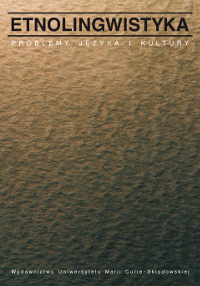Мифологическая языческая и христианская символика вербы в восточнославянских и польских фразеологизмах
MMYTHOLOGICAL, LINGUISTIC AND CHRISTIAN SYMBOLISM OF ‘WILLOW’ IN EAST SLAVONIC AND POLISH PHR ASEOLOGICAL ITEMS
Author(s): Miroslava MalohaSubject(s): Anthropology, Language studies, Language and Literature Studies, Applied Linguistics
Published by: Wydawnictwo Naukowe Uniwersytetu Marii Curie-Sklodowskiej
Keywords: willow; the symbolism of a willow; phrasemes; Polish phrasemes; Ukrainian phrasemes; beliefs and practices; pear tree [‘grusza’]; devil—chort [‘diabeł/czort’]; equivalence relation
Summary/Abstract: The article attempts to describe cultural connotations of phrases with the words wierzba or wierzbowy (‘willow’ as a noun or adjective, ‘willowy’, 'willowish’, ‘willow-like’). The analysis comprises linguistic data, such as phrases, proverbs, fairy tales, as well as descriptions of beliefs and practices.In Slavonic culture the symbolism of ‘willow’ is diversified. On the one hand it is associated with fertility, quick growth, liveliness and physical flexibility, but on the other with infertility, deafness, silence and death. In East Slavonic languages and in Polish, phrases with the word meaning ‘willow’ express lack, a black force or emptiness. In Christian customs and practices, however, the word connot.es life, joy and Sunday. In Byelorussian, Ukrainian and Polish phrasal expressions, beside the component, ‘willow’, the component ‘pear tree’ is also frequent, both being associated with an evil force. Additionally, Polish and Ukrainian concepts contain the components ‘devil’ and ‘dry’. Furthermore, there is equivalence between ‘willow’ and ‘palm tree’: the East Slavonic Verbnoe Voskresnye (lit. ‘willow Sunday’) is paralleled by the Polish Niedziela Palmowa (Palm Sunday).
Journal: Etnolingwistyka. Problemy Języka I Kultury
- Issue Year: 11/1999
- Issue No: 11
- Page Range: 129-138
- Page Count: 10
- Language: Russian

